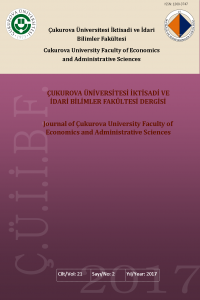Öz
Kaynakça
- Bernard, A. B. ve Busse, M. R. (2004). Who wins the olympic games: Economic resources and medal totals. The Review of Economics and Statistics, 86(1), 413- 417.
- Bian, X. (2005). Predicting olympic medal counts: The effects of economic development on olympic performance. The Park Place Economist, 13, 37-44.
- Den Butter, F. A. G. ve Van Der Tak, C. M. (1995). Olympic medals as an indicator of social welfare. Social Indicators Research, 35(1), 27-37.
- Gelade, G. A. ve Dobson, P. (2007). Predicting the comparative strengths of national football teams. Social Science Quarterly, 88(1), 244-258.
- Hoffmann, R., Ging, L. C. ve Ramasamy, B. (2002a). Public policy and olympic success. Applied Economics Letters, 9(8), 545-548.
- Hoffmann, R., Ging, L. C. ve Ramasamy, B. (2002b). The socio-economic determinants of international soccer performance. Journal of Applied Economics, 5(2), 253-272.
- Hoffmann, R., Ging, L. C., Matheson, V. ve Ramasamy, B. (2006). International women’s football and gender inequality. Applied Economics Letters, 13(15), 999- 1001.
- Houston, R. G. ve Wilson, D. P. (2002). Income, leisure and proficiency: An economic study of football performance. Applied Economics Letters, 9(14), 939-943.
- Johnson, D. K. N. ve Ali, A. (2004). A tale of two seasons: Participation and medal counts at the summer and winter olympic games. Social Science Quarterly, 85(4), 974-993.
- Leeds, M. A. ve Leeds, E. M. (2009). International soccer success and national institutions. Journal of Sports Economics, 10(4), 369-390.
- MacMillan, P. ve Smith, I. (2007). Explaining international soccer rankings. Journal of Sports Economics, 8(2), 202-213.
- Oyeyinka, O. (2007). The determinants of participation and success at olympic games: A cross-country analysis. Carroll Round Proceedings, 2, 156-180.
- Saatçioğlu, C. ve Karaca, O. (2012). Ekonomi ve spor: Ekonomik gelişmenin uluslararası sportif başarı üzerindeki etkisi. Yalova Üniversitesi Hukuk Fakültesi Dergisi, 1(1), 27-42.
- Torgler, B. (2004). The determinants of women’s international soccer performances. Center for Research in Economics, Management and the Arts Working Paper, No: 2004-19.
- Torgler, B. (2006). ‘Historical excellence’ in soccer world cup tournaments: Empirical evidence with data from 1930 to 2002. Rivista di Diritto ed Economia dello Sport, 2(1), 101-117.
Türkiye’deki İllerin Ekonomik Gelişmişlik Seviyesinin Futboldaki Performansları Üzerindeki Etkisi: Zengin İller Futbolda Daha mı Başarılı?
Öz
Bu çalışmada Türkiye’deki illerin futboldaki performanslarında ekonomik gelişmişlik seviyelerinin bir etkisi olup
olmadığı araştırılmıştır. Çalışmada 2010-2014 dönemine ilişkin veriler kullanılarak yatay-kesit regresyon analizleri
yapılmıştır. İllerin futboldaki başarısının göstergesi olarak futbol takımlarının profesyonel liglerde aldıkları puanlar
kullanılmıştır. İllerin ekonomik gelişmişlik seviyesinin göstergesi olarak ise cari fiyatlarla kişi başına GSYH ele
alınmıştır. Regresyon analizlerinde kontrol değişkeni olarak illerin nüfusuna, futbol kültürüne ve iklim şartlarına
ilişkin göstergelere de yer verilmiştir. Yapılan analizler sonucunda illerin futboldaki performanslarında ekonomik
gelişmişlik seviyelerinin etkisi olduğu bulunmuştur. Ancak bu etki doğrusal değildir ve illerin ekonomik gelişmişlik
seviyesi arttıkça azalmaktadır. Bir noktadan sonra ise ekonomik gelişmişlik seviyesi futbol performansını olumsuz
etkilemeye başlamaktadır.
Anahtar Kelimeler
Ekonomik Gelişme Bölgesel Gelişme Futbol Başarısı Yatay-Kesit Analizi
Kaynakça
- Bernard, A. B. ve Busse, M. R. (2004). Who wins the olympic games: Economic resources and medal totals. The Review of Economics and Statistics, 86(1), 413- 417.
- Bian, X. (2005). Predicting olympic medal counts: The effects of economic development on olympic performance. The Park Place Economist, 13, 37-44.
- Den Butter, F. A. G. ve Van Der Tak, C. M. (1995). Olympic medals as an indicator of social welfare. Social Indicators Research, 35(1), 27-37.
- Gelade, G. A. ve Dobson, P. (2007). Predicting the comparative strengths of national football teams. Social Science Quarterly, 88(1), 244-258.
- Hoffmann, R., Ging, L. C. ve Ramasamy, B. (2002a). Public policy and olympic success. Applied Economics Letters, 9(8), 545-548.
- Hoffmann, R., Ging, L. C. ve Ramasamy, B. (2002b). The socio-economic determinants of international soccer performance. Journal of Applied Economics, 5(2), 253-272.
- Hoffmann, R., Ging, L. C., Matheson, V. ve Ramasamy, B. (2006). International women’s football and gender inequality. Applied Economics Letters, 13(15), 999- 1001.
- Houston, R. G. ve Wilson, D. P. (2002). Income, leisure and proficiency: An economic study of football performance. Applied Economics Letters, 9(14), 939-943.
- Johnson, D. K. N. ve Ali, A. (2004). A tale of two seasons: Participation and medal counts at the summer and winter olympic games. Social Science Quarterly, 85(4), 974-993.
- Leeds, M. A. ve Leeds, E. M. (2009). International soccer success and national institutions. Journal of Sports Economics, 10(4), 369-390.
- MacMillan, P. ve Smith, I. (2007). Explaining international soccer rankings. Journal of Sports Economics, 8(2), 202-213.
- Oyeyinka, O. (2007). The determinants of participation and success at olympic games: A cross-country analysis. Carroll Round Proceedings, 2, 156-180.
- Saatçioğlu, C. ve Karaca, O. (2012). Ekonomi ve spor: Ekonomik gelişmenin uluslararası sportif başarı üzerindeki etkisi. Yalova Üniversitesi Hukuk Fakültesi Dergisi, 1(1), 27-42.
- Torgler, B. (2004). The determinants of women’s international soccer performances. Center for Research in Economics, Management and the Arts Working Paper, No: 2004-19.
- Torgler, B. (2006). ‘Historical excellence’ in soccer world cup tournaments: Empirical evidence with data from 1930 to 2002. Rivista di Diritto ed Economia dello Sport, 2(1), 101-117.
Ayrıntılar
| Birincil Dil | Türkçe |
|---|---|
| Bölüm | Araştırma Makaleleri |
| Yazarlar | |
| Yayımlanma Tarihi | 29 Aralık 2017 |
| Gönderilme Tarihi | 1 Aralık 2017 |
| Yayımlandığı Sayı | Yıl 2017 Cilt: 21 Sayı: 2 |


